|
|
|
Sort Order |
|
|
|
Items / Page
|
|
|
|
|
|
|
| Srl | Item |
| 1 |
ID:
174712
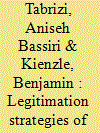

|
|
|
|
|
| Summary/Abstract |
The European Union has seen the rise of informal groups of states as an increasingly important governance mechanism within its formal structures. Such groups can make decision-making processes more efficient, but they also suffer from a substantial lack of legitimacy in the eyes of the non-members. In this article, we examine how informal groups overcome this fundamental dilemma between efficiency and legitimacy and sustain themselves at the forefront of important policy areas. To this end, we trace the development of what we argue to be a particularly useful case: the E3 directoire in the nuclear negotiations with Iran. The empirical results point to new insights into how directoires – and informal groups in general – can use different types of legitimation strategies to gain and maintain legitimacy. More specifically, the E3 implemented three successive legitimation strategies – detachment, co-optation and integration – using different types of legitimacy sources, in particular problem-solving, institutional adjustments and fostering institutional and policy congruence.
|
|
|
|
|
|
|
|
|
|
|
|
|
|
|
|
| 2 |
ID:
174705
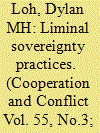

|
|
|
|
|
| Summary/Abstract |
Sovereignty is the core concept of international relations. Almost without exception, approaches to sovereignty in IR have followed a binary framing where sovereignty is seen to consist of two components: ‘internal’ versus ‘external’ sovereignty, ‘positive’ versus ‘negative’ sovereignty, and so on. These dichotomies stem from the prevailing understanding of sovereignty as the boundary between the inside and the outside of the state. This article builds on and expands these existing approaches by reconceptualizing the sovereign border line as a liminal border space. Relatedly, we theorize the concept of liminality in greater depth by distinguishing between four distinct kinds of liminality: marginal, hybrid, interstitial, and external. Each of these problematizes the dividing line of sovereignty in unique but comparable ways. We empirically illustrate these four kinds of liminality with reference to contested states, ‘tribal’ or ‘indigenous’ groups, NGOs such as Amnesty International, and extremist groups such as ISIS, respectively. Each of these types of liminality entails unique actors, practices, and consequences for the concept of sovereignty. We suggest that liminal sovereignty practices represent the most radical source of change for the concept of sovereignty, yet at the same time, somewhat counterintuitively, they also serve as the best means of clarifying existing, established meanings and practices of sovereignty.
|
|
|
|
|
|
|
|
|
|
|
|
|
|
|
|
| 3 |
ID:
174709


|
|
|
|
|
| Summary/Abstract |
Since Serbia and Kosovo began their political and technical dialogue mediated by the European Union in 2011, numerous agreements were signed, but few of them implemented. In addition, since 2018 the idea of partitioning Kosovo along ethnic lines has entered public debates. This article asks why that is the case and argues that Northern Kosovo – specifically, who has the right to claim statehood over this area – lies at the heart of why partition was suggested as a viable option and why so few agreements have been implemented. In order to demonstrate this, the article adopts a performative view of statehood, particularly suitable for states ‘in-becoming’, such as Kosovo. As only externally performed statehood has been examined so far, that is, efforts for international recognition, this article extends performativity to internally negotiated statehood, against the background of two political systems competing for legitimacy in the long run. This is the case with Northern Kosovo, conceptualized as an area of overlapping limited statehood. The developed analytical framework can be extended to other cases of territorial disputes, such as Crimea or Palestine. The framework can also be expanded to explore performativity of statehood in areas where statehood is not institutionally disputed, but rather symbolically.
|
|
|
|
|
|
|
|
|
|
|
|
|
|
|
|
| 4 |
ID:
174708
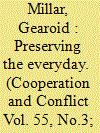

|
|
|
|
|
| Summary/Abstract |
Quite a lot of recent peacebuilding scholarship has deployed the concept of ‘the everyday’. In an extension of the local turn’s emphasis on agency and resistance, much of this scholarship interprets the everyday as inherently a site of politics. It does so either by interpreting every act (no matter how motivated) as an agentic political act, or by equating agentic political acts (at the local level) with the quotidian activities which define the everyday. This article argues, however, that representing the everyday in this way interprets both forms of activity in ways which have critical implications for peacebuilding theory, because both moves inadvertently strip everyday acts of the emergent creativity and innovation inherent to ‘everyday-ness’. Alternative understandings of and engagement with different forms of agency would encourage peace scholars to acknowledge the overtly political nature of peace projects and so to reserve ‘the everyday’ label for pre-political forms of action which may contribute to peace, but in a more unintentional, organic or emergent fashion. This is not to argue that everyday acts are a-political or non-political, but only that they do not have political motivations and are not themselves products of conscious will to power, or even to peace itself.
|
|
|
|
|
|
|
|
|
|
|
|
|
|
|
|
| 5 |
ID:
174706
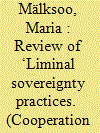

|
|
|
|
|
| Summary/Abstract |
The online publication of the article ‘Liminal sovereignty practices: Rethinking the inside/outside dichotomy’ moves away from the standard depiction of sovereignty as operating on the line between the inside and the outside of the state (Loh and Heiskanen, 2020). The authors seek to reconceptualize the said dividing line (border line) as a liminal space (border space) and, by extension, theorize the concept of liminality in greater depth and nuance. Sovereignty is accordingly taken to be grounded in three distinct spaces (the domestic society, the international realm and the liminal space between the two), loaded with various sovereignty practices. Liminality is theorized as an attribute of sovereignty. The authors offer a systematization of various ambiguous types of ‘borderline’ sovereignty, contesting the standard notions and practices of sovereignty to varying degrees. The article distinguishes between four distinct kinds of liminality: marginal (e.g., contested states); hybrid (e.g., indigenous peoples/tribal sovereignty); interstitial (e.g., non-state actors); and external (e.g., terrorists and anarchists) liminality – each with unique actors, practices and consequences for the concept of sovereignty.
|
|
|
|
|
|
|
|
|
|
|
|
|
|
|
|
| 6 |
ID:
174707
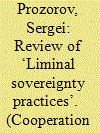

|
|
|
|
|
| Summary/Abstract |
I recommend that the article should be revised and resubmitted. This is a very well-written and clearly argued piece that offers a systematic and analytical treatment of the concept of liminality that the authors suggest as an alternative to the binary inside/outside thinking that characterizes both the traditional international relations (IR) theory and its post-structuralist critique that remains fixated on the dividing line between the inside and the outside, even as it affirms its contingency, fluidity, haziness, and so on. While the authors’ argument, particularly their typology of liminal practices, is very interesting and suggestive, I am not certain that it succeeds in solving the problems the authors claim it does, at least on the level they claim it does. Below I address three problems with the argument.
|
|
|
|
|
|
|
|
|
|
|
|
|
|
|
|
| 7 |
ID:
174710
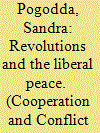

|
|
|
|
|
| Summary/Abstract |
This article explores the relationship between contemporary revolutionary agency, domestic reforms and liberal peacebuilding in the aftermath of the Arab Uprisings. In particular, it focuses on the tensions between the liberal peace’s orthodox and emancipatory strands by asking: Does liberal peacebuilding support or hinder revolutionary emancipation in the Arab region? The article aims to close a gap in PCS scholarship by delivering insights into contemporary revolutionary processes (here called ‘everyday state formation’). After elaborating the disjunctures between revolutionary agency and liberal peacebuilding interventions in the spheres of statebuilding, development and democratisation, many peacebuilding interventions appear as counterrevolutionary practices.
|
|
|
|
|
|
|
|
|
|
|
|
|
|
|
|
| 8 |
ID:
174711
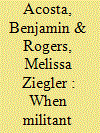

|
|
|
|
|
| Summary/Abstract |
The literature on political violence emphasizes two main ways that militant organizations ‘win’: eliminating the adversary outright or coercing the adversary into making concessions. While most do not win in this way, some organizations that fail to win go on to achieve their goals in post-conflict political competition. What explains variation in the post-conflict political success of militant organizations that did not achieve their organizational goals on the battlefield? In this study, we run the first large-n empirical analysis of the phenomenon. Our empirical results show that organizational size and wartime lethal capacity positively predict the political success of militant organizations that did not win on the battlefield. Other plausibly related features of militant organizations, such as their united wartime front or coherent ideology, do not predict eventual political success. Additionally, we investigate the case of Frente Farabundo Martí para la Liberación Nacional in El Salvador and present marginal effects analyses—further illustrating the effects of a legacy of violence and organizational size on post-conflict political success.
|
|
|
|
|
|
|
|
|
|
|
|
|
|
|
|
|
|
|
|
|